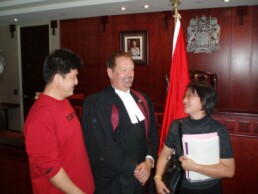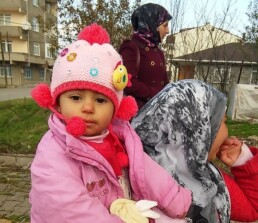Andrew Scheer’s Election Defies Anti-Immigrant Sentiment
CPC’s New Stance on Canadian Immigration Good, But Needs Improvement
Two months on from their May convention, Canada’s Conservatives have spoken: the anti-immigration sentiment that has been gaining ground internationally is not going have a place in Canada.
By electing Andrew Scheer as their new party leader, the Conservatives chose a moderate approach. This is especially true when compared to other candidates in the running. Tougher immigration policies, including screening for Canadian values during the immigration application process, got attention, but that type of populist agenda goes against actual Canadian values. Embracing Canadian immigration and our diverse multicultural society have won out for now.
How Moderate is Moderate?
In late June, Scheer distanced himself and the Conservative party from a controversial tweet from former leadership rival Kellie Leitch. While Scheer avoided specifically addressing the tweet, he stated, “The Conservative party under my leadership will continue to be an inclusive, welcoming party that welcomes not only immigrants, but also refugees, and ensures that Canada plays its role in welcoming people from difficult situations.”
This statement echoes Scheer’s moderate approach. Though he believes Canada should welcome refugees, Scheer nonetheless seeks to promote privately-sponsored Canadian immigration as opposed to government sponsorship. Even with Scheer’s moderate approach, though, there’s still much room for improvement. While his stance is a far cry from Kellie Leitch’s proposed “Canadian values” screening process, Scheer nonetheless voiced some support for increased screening. The Globe and Mail quoted him as saying, “I absolutely believe that we have core Canadian values that we need to promote and protect and defend.”
International Anti-Immigration Sentiment
Anti-immigration sentiments have been at the forefront of international election campaigns recently. U.S. President Donald Trump vowed to toughen immigration policies in the U.S.; Britain voted to leave the European Union in order to slow down immigration; and one of France’s presidential candidates—Marine Le Pen—is a far-right nationalist. And while some Canadians hold these beliefs as well, Canadian leaders and lawmakers will hopefully not be pushed in that direction any time soon, even within the Conservative party.
Leading up to the CPC convention, Leitch saw comparison to Trump and Le Pen for her anti-immigration stances. But since Canada has always relied on immigration to be a strong country (socially, economically, and culturally), tougher immigration policies, such as those proposed by Leitch, would hurt Canadian society. Anti-immigration would only strengthen divisions between cultures, causing Canada to take a giant leap backwards social and economic progress.
With the current anti-immigration climate in Europe and the U.S., immigration is still a divisive topic, even in Canada. Canada, though, can continue to grow as an inclusive country. After all, welcoming newcomers from diverse cultural backgrounds is always more productive than turning people away because they are different.
Overcoming Challenges in the Canadian Immigration Process
A Look at Some of The Immigration Challenges That May Be Holding Back Immigration to Canada
During the U.S. presidential election campaign, the running joke amongst many Americans was that if the election didn’t go their way, they could always move north to Canada. But while Americans have a habit of threatening to move to Canada during elections, few actually go through with the move, and the Canadian immigration system and citizenship process may be partially to blame. There are many forms, and many requirements inherent within the Canadian immigration system
Ottawa-based citizenship lawyers are here to help make the process as easy as possible. They specialize in helping you come and establish yourselves in Canada. However, the process requires patience and commitment on your part. Some considerations you may want to take into account before uprooting to Canada include:
Costs
For those looking for permanent residence through streams such as Express Entry or Humanitarian & Compassionate claims, the processing fee is $550. Once granted, applicants must pay another fee for the ‘right of permanent residence’ in the sum of $490.
If sponsoring a family member, an additional $75 sponsorship is also required.
Fees must also be paid for citizenship. The application fee itself is $530, while the right-of-citizenship fee is an extra $100. In the event that the citizenship application is denied, only the $100 fee will be refunded.
Learn more about the various application fees here.
Residency Requirements
To maintain their status as a Permanent Resident, applicants must live in Canada* at least 2 out of every 5 years. Meanwhile, to gain citizenship, an applicant must be physically present in Canada as a permanent resident for at least three out of five years immediately before the date of their citizenship application. Thanks to new legislation passed earlier this year, applicants who have spent time in Canada before (for example, on a study visa) may now count up to one year of time against this requirement.
Individuals who have been found to not comply with their residency obligations may lose their permanent residency. However, such a finding can be challenged at the Immigration Appeal Division of the IRB.
* You are still considered to be “in Canada” if you are travelling with a spouse who is a Canadian citizen; an employee of (or under contract for) a Canadian business; or travelling with a spouse/partner who is a Canadian PR and is working full-time for a Canadian business or the public service.
Proof of Income
For proof of income and employment, Citizenship applicants must provide tax returns for three years out of the five that they have lived in Canada as a permanent resident.
If applying through Express Entry without a valid job offer, the requirements are rigorous. For example, IRCC requires letters from banks outlining applicant’s average account balances over the previous six months to the application (amongst other information); and that finances used towards settlement funds be liquid. Furthermore, applicants must demonstrate they can support their whole immediate families, even if they are non-accompanying.
Processing Times
Canadian visa offices are notoriously slow. Depending on which visa office an applicant applies through, and for which stream, applications can take years to process. In-land applications are little better: currently, spousal sponsorships take over two years on average to be approved. This does not include return times if an application is found to be incomplete.
Canada introduced the Express Entry system to economic classes to help speed these processing times up. The average quote for Express Entry after receiving an Invitation to Apply and applying is currently around 6 months long.
Denials
Even if applicants meet all of the requirements, there are many situations that could lead to citizenship applications being denied. Applicants may be denied Canadian citizenship if they:
- Are serving a prison sentence in or outside of Canada, or are on parole or probation in Canada;
- Are charged, being tried, or appealing an indictable offence committed in or outside of Canada, or an offence under the Citizenship Act;
- Have been convicted of an indictable offence, or an offence under the Citizenship Act, in or outside of Canada within the four years prior to the application;
- Have been convicted of high treason, treason, terrorism, or spying offences while being a permanent resident;
- Served as a member of a country’s armed force or armed group that engaged in armed conflict with Canada while being a permanent resident;
- Have a removal order;
- Are under investigation, being tried, charged, or convicted for, or appealing a war crime or a crime against humanity;
- Had a citizenship application denied in the past five years for misrepresentation;
- Had Canadian citizenship revoked in the past 10 years for fraud; or,
- Do not meet the requirements for a grant or resumption of citizenship.
Citizenship requirements may pose some barriers for those wishing to move to Canada. Thankfully, Canadian citizenship is attainable with adequate financial and social support and patience. For those interested in becoming a Canadian citizen, a citizenship lawyer can provide assistance with the application process. Contact a citizenship lawyer today to see how they can assist you, whatever your pathway to Canada is.
Advocacy Groups Challenge Refugee Law in Federal Court
Refugee Advocates Challenge the Safe Third Country Agreement, Responsible for Turning Away Asylum Seekers
For the second time since its introduction in 2004, the Safe Third Country Agreement will be challenged in the Federal Court of Canada. A bilateral agreement between Canada and the United States, the Safe Third Country Agreement establishes that those seeking refugee status in either Canada or the U.S. must do so in the first country they arrive in. In short, even if someone wishes to make a refugee claim in Canada, they become ineligible to do so if they step foot on U.S. soil first.
Given the current U.S. political atmosphere, including the U.S. government’s approach to refugees, many are questioning its utility and morals. This has culminated in a legal challenge against the Agreement which claims it violates asylum-seekers’ basic human rights.
Challenges at Border Crossings
The Safe Third Country Agreement is only enforceable at official Canadian-U.S. border crossing. As such, many asylum seekers have crossed into Canada at unofficial borders in search of a chance at a better life in Canada. These people often cross in dangerous conditions, risking their lives and limbs to get here.
The main challenge against this agreement is that the U.S. is indeed not a safe country for refugees. Some of the more egregious failings of the U.S.’ current refugee system include bars on claiming asylum if done outside of one year of arrival; expedited removals without hearings; detaining asylum-seekers for the duration of their claims process; turning back asylum-seekers at the U.S.-Mexico border (which is illegal under international law); and inconsistent adjudications across the country. As a result, many individuals with strong claims may nevertheless face the risk of a denied application, if not outright deportation, especially now that the Trump administration is enforcing anti-immigration policies.
For more information, read the brief from Amnesty International.
Legal Challenges to Agreement
On July 5, 2017, three advocacy groups joined a legal challenge against the Safe Third Country Agreement in Canada. Amnesty International, the Canadian Council of Churches, and the Canadian Council for Refugees are part of a court challenge filed by a woman from El Salvador whose asylum claim was automatically rejected at the Canadian border due to the Safe Third Country Agreement.
The woman and her two daughters fled from gang violence and death threats in El Salvador, landing in the U.S. in November 2016. She feared that they would be detained and deported had she filed a refugee claim in the U.S., so they continued to Canada. After their asylum claims were rejected, she filed a federal court challenge of the agreement. Her lawyers are working to keep her and her family in Canada for the duration of the court proceedings.
The first challenge to the agreement was in 2004, soon after it was introduced. A federal court judge ruled that the U.S. was not a safe country for refugees and the agreement should no longer exist. However, the Canadian government managed to successfully appeal this decision and the Supreme Court of Canada declined the appeal.
Hopefully, for the sake of this woman, her daughters, and all asylum-seekers who don’t feel safe in the U.S., this legal challenge will overturn the Safe Third Country Agreement. Too many asylum seekers have been risking their lives, especially in dangerous winter weather, for a chance to have their asylum claims heard. By overturning the Safe Third Country Agreement, Canada will uphold its international obligations and provide everyone who fears returning to their home the opportunity to be heard equally, regardless of how they arrived.
Wanted: Skilled Immigrants with Tech Experience
Ontario’s Targeted Occupations Announced for Express Entry Immigration Stream
Canada relies on skilled immigrants to fulfill labour shortages in various industries. Without this global talent, national and provincial economies could suffer. Various regions in Canada with low working age population or shortages with skilled workers rely on immigration to meet their economic and occupational needs.
To meet industry demands, provinces nominate eligible candidates from the Express Entry pool. Provincial nominations grant candidates additional Comprehensive Ranking System (CRS) points, which help them qualify for Invitations to Apply (ITA) for permanent resident status in Canada. For more information about the Express Entry program and provincial nominations, contact an immigration lawyer in Canada.
Ontario recently selected candidates from the Express Entry pool under the Human Capital Priorities (HCP) stream. These candidates were chosen for their experience in the Information and Communications Technology (ICT) industry.
Human Capital Priorities Stream
The Human Capital Priorities (HCP) stream aligns with the Express Entry program, as part of the Ontario Immigrant Nominee Program (OINP). Eligible candidates in the HCP stream typically need a minimum of 400 CRS points, but those with experience in specific occupations in the ICT industry were deemed eligible for a Notification of Interest (NOI—i.e. an ITA for a provincial nomination) from Ontario, even if their CRS score didn’t exceed 400.
Other HCP stream eligibility criteria include:
- A minimum level of work experience;
- A Canadian post-secondary education, or equivalent;
- English or French language proficiency level of 7 (Canadian Language Benchmark—CLB) or higher for speaking, reading, writing, and listening;
- An intention to live in Ontario;
- Sufficient funds to settle in Ontario; and,
- The other criteria for the Federal Skilled Worker Class (FSWC) or the Canadian Experience Class (CEC).
Information and Communications Technology Occupations
Ontario selected candidates that met HCP eligibility requirements with experience in one of the following target occupations in the ICT industry:
- Telecommunication Carriers Managers
- Computer and Information Systems Managers
- Electrical and Electronics Engineers
- Computer Engineers (Except Software Engineers and Designers)
- Information Systems Analysts and Consultants
- Database Analysts and Data Administrators
- Software Engineers and Designers
- Computer Programmers and Interactive Media Developers
- Web Designers and Developers
- Electrical and Electronics Engineering Technologists and Technicians
- Computer Network Technicians
- User Support Technicians
- Systems Testing Technicians
- Broadcast Technicians
- Graphic Designers and Illustrators
Information and communications technology is always evolving, so going into one of these career fields is a wise decision for both Canadians and skilled immigrants who wish to work in Canada. For those interested in entering the Express Entry pool and obtaining permanent residence via the HCP stream, an immigration lawyer in Canada can help with the application process.
Canada’s Open, Rational, and Successful Immigration System
Canada Asserts Open Immigration Policy Following Reinstatement of US Travel Ban
While the US closes its doors to immigrant populations with the reinstatement of a travel ban against six majority-Muslim countries, Canada continues to do what it does best: openly welcome immigrants from around the globe. Canada’s immigration system has been a success for years. It doesn’t discriminate against applicants based on their ethnicity, race, or religion. Instead, applicant selection is based on how well they will succeed in and contribute to Canadian society.
Canada’s immigration system is an example of how a country can benefit from welcoming many newcomers. When a country opens its doors to populations, it is supporting its ability to grow socially and economically. For more information on the immigration application process, contact a Canadian immigration law firm.
In response to the travel ban's reinstatement, Canadian Prime Minister Justin Trudeau promoted Canada’s open immigration policy. Trudeau promoted the system's success and benefits, highlighting that it didn't compromise the security of Canadians. Trump’s travel ban focuses on security concerns, banning entire populations deemed a potential threat to the US. Trump wants immigration reform that mirrors Canada’s successful point-based system. But banning newcomers based on their home country will not improve the US economy or society.
A New York Times op-ed discussed the success of Canada’s immigration policy, and how it influences US President Donald Trump’s idea for immigration reform. Trump is pushing for a merit-based system that will bring in more skilled workers who will contribute to the economy. This stands in contrast to the current system that largely promotes family reunification.
Canada’s system promotes economic immigration—attracting skilled workers who can contribute to Canada’s economy. But Canada also acknowledges the importance of family reunification. Newcomers are more successful with resettlement when they have family nearby for social, emotional, and financial support.
Despite the growing fear of terrorist threats and the anti-immigration sentiments, boldly stated both in the US and Europe, Canadians, for the most part, support the open immigration system. Many acknowledge how beneficial immigration is to both Canadian society and the economy.
Many Canadians are proud of the multiculturalism that immigration brings to Canada, and the open-mindedness of these Canadians is necessary for the country to continue to grow and prosper. Open and welcome immigration sentiments combined with a rational immigration system have made Canada a leader and inspiration for immigration policy.





